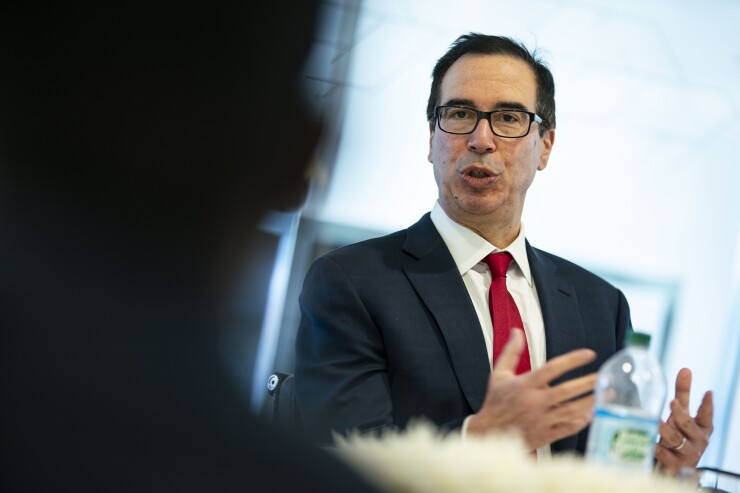Receiving Wide Coverage ...
Stalemate
Congressional Republicans and Democrats “fell short of an agreement on the
“In a call with lawmakers, President Trump indicated that he was open to considering other funds with the small-business loan program,” Sen. Roy Blunt, R-Mo., told the paper. “Apparently the president’s open to discussing another topic or two.”
“More money is expected to come, but when is an open question,” the New York Times says. “Congressional leaders and the Trump administration are discussing adding hundreds of billions of dollars to replenish the program, but have failed to reach an agreement. On Thursday, staff of the Democratic leadership held talks with Treasury staff about ways to break the impasse, but Senator Mitch McConnell, the majority leader, said no progress had been made, and he
Fintech companies “were eager to participate” in the program,” the Journal says, “but some aspects of the government programs rendered much of the industry less effective. A new Federal Reserve facility that will finance billions of dollars of the loans excludes lenders that aren’t banks. What’s more,
“With the Paycheck Protection Program’s initial funds depleted, lenders are stepping up efforts to
Eye on mortgage firms
Treasury Secretary Steven Mnuchin “is under growing pressure from industry officials and members of Congress to ease strains on mortgage companies as millions of borrowers skip their monthly payments amid the coronavirus outbreak. The Treasury secretary is a key figure because he must agree to let the Federal Reserve set up a program to backstop the companies. Industry officials believe the central bank supports such a plan, while Treasury officials are seen as more lukewarm,” the Journal says.

“Industry officials and policy makers say their concern isn’t just that some mortgage firms will fail without help, but that uncertainty over the costs of servicing loans
Meanwhile, “another storm is brewing” in the market for warehouse lines of credit, “which are used by non-banks to originate loans before selling them to private investors or to government-backed agencies,” the Financial Times reports. “Traders, mortgage companies and regulators are scrambling to work out how this process will be affected by a
"In a normal world, warehoused loans have very low default rates because the mortgages are brand new, and people can typically make their first few months’ payments," the Financial Times says. "But this is not a normal world. U.S. officials have told mortgage holders that they can take a 90-day holiday from servicing loans without facing any penalties. That raises the specter of warehoused loans going into default before they can be sold — creating problems for both agency and non-agency originators.”
New York Times
Cutting back
Facebook and its partners Thursday “rolled out a less ambitious design” for their Libra cryptocurrency in “response to a global outpouring of opposition” to the project. “No longer is the group focused on making Libra the basis of a new global financial system where Facebook could essentially play the roles of a central bank and Wall Street,” the paper says.
“The Libra project will now focus on creating a more traditional payment network in which coins will be
Elsewhere
New U.K. money app
Santander launched a money service app in the U.K. that will enable users to transfer of up to 3,000 pounds ($3,740) for free, Reuters reports. The Spanish bank said PagoFX, “a low-cost international money transfer service, would allow U.K. residents with a debit card issued by any U.K. bank or financial entity to
Unhappily abstaining
Activist investor Sherborne Investors “said it would





